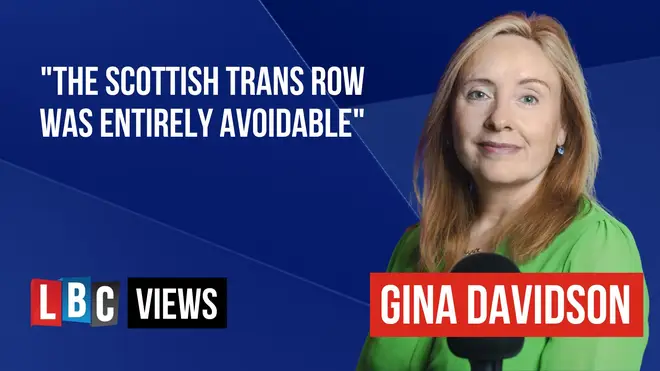
Henry Riley 4am - 7am
17 January 2023, 19:43 | Updated: 18 January 2023, 13:08

It didn't need to be like this, writes LBC's Scotland political editor Gina Davidson.
The almighty constitutional row which has blown up over the Scottish Government's bill to change how trans people can gain a Gender Recognition Certificate and legally change their sex was entirely avoidable.
But then fighting about the constitution is familiar, possibly almost comfortable, territory for both the Scottish and UK governments.
The Gender Recognition Reform Bill is not about independence or the union. It's about the lives of trans people who are seeking a simpler way in which to get their birth certificate aligned with the gender they believe they are. That is, at least the Scottish Government's belief about the legislation - and indeed is the argument of many trans people and campaigners.
But there have been concerns raised by many women's organisations in Scotland that the process the Scottish Government has introduced in its reforms puts single sex spaces, used particularly by vulnerable women, at risk. There have also been concerns about the introduction of "self-identification" into law, giving the ability to any person, especially any man, to declare themselves the opposite sex without any diagnosis of gender dysphoria as the current law demands. That would include men who are in prison or facing charges of rape or other sexual assault against women.

Wes Streeting 'angry' about Rishi Sunak blocking Scotland's gender law
Such concerns, dismissed at one point by Nicola Sturgeon as being "not valid", are now being cited by the UK government as a reason to block the bill. UK ministers also believe that having two different processes in the UK to change legal sex, one more rigorous south of the border than the one in the north, could lead to "fraudulent" applications.
The UK government also says there are impacts on the operation of the Equality Act around equal pay claims, single sex schools and associations, even sport - and not just in Scotland, but in the whole of the UK, as there would be nothing to prevent someone with a Scottish GRC moving south of the border. And the Equality Act is a UK-wide piece of legislation which is purely reserved to Westminster. Upon its turf, the Scottish Parliament is not allowed to tread.
So we now have a constitutional row. Pick your side. Euther the UK government is undermining devolution and Scottish democracy by use of the section 35 order, or it is in fact using devolution legislation appropriately to prevent over-reach by the Scottish Government.
What is for sure is that both governments have obviously failed to talk and listen to each other ahead of the Bill passing through Holyrood. Alister Jack, the Scottish Secretary, says his officials did speak with the Scottish Government, and the Equalities Minister Kemi Badenoch also raised concerns. These were, says Jack "ignored" by Shona Robison, the Scottish minister who piloted the bill. For her part, she says the UK government only got in touch at the last moment, and she has accused it of not involving itself in the consultation process.

16-year-old trans caller: I think people need to understand the difference between sex and gender
But others who did respond to the consultations and in fact met with the minster and her officials did point out the potential clash with the Equality Act, but they tended to be the same people whose views had earlier been dismissed as "not valid". Even the Equality and Human Rights Commission waved a red flag - while amendments by Scottish Labour which could have made the Bill less troubling to the UK government, were defeated.
This issue has been a running sore in Scottish politics for years. Transgender people complain that getting a medical diagnosis of dysphoria which would allow them to gain a GRC under the current UK-wide system is next to impossible because of waiting lists. There has been little progress on that front which might have done anyway entirely with any need to ove to a self-declaration model. Instead the Scottish Government has pinned everything on this Bill which now is heading for the courts.
You can't help but think that with a little less hubris, a little more listening, a little less antagonism on all sides, that this whole sorry mess could have been avoided. And trans people would not now be just another political football in a constitutional game which seems to have no end.